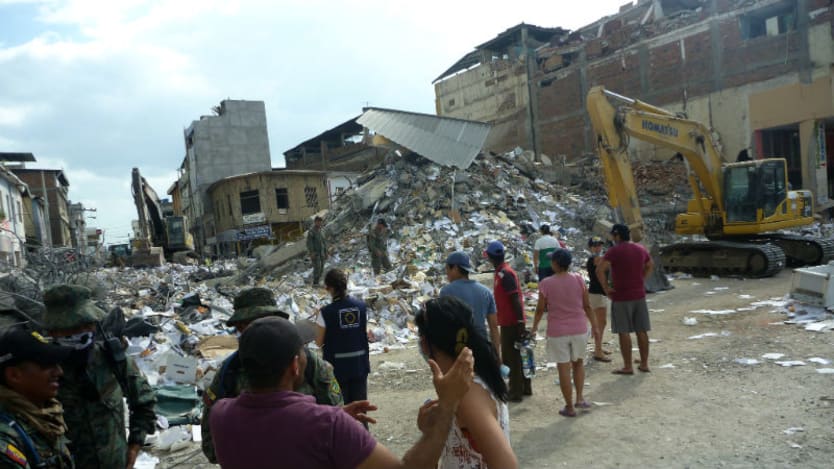
When 5,000 leaders converge this month on Istanbul, Turkey, at the first World Humanitarian Summit, their goal will be “to stand up for our common humanity and take action to prevent and reduce human suffering.”
I hope that these heads of state, leaders of businesses, aid organizations, civil society and affected communities will also focus on the needs of people with mental disorders. Humanitarian disasters affect some 125 million people today, 4-6 million of which are estimated to have severe mental disorders.
War and natural disasters can affect everyone, but people with severe mental disorders face further risks: the health care and social systems that they depend on can break down; longtime support providers can disappear; access to medicines can evaporate; and families can disintegrate.
Given their special vulnerability, people with severe mental disorder deserve special protection even during the best of circumstances. During emergencies, even more so to prevent abandonment, murder, or other horrible events that can happen in war and disaster settings.
A first step would be for organizations responding to emergencies to integrate mental health care into pre-existing disability programs, health care services, social services and education systems.
At the World Health Organization, we have built numerous tools that can be used as templates, including the Inter-Agency Standing Committee’s Guidelines for Mental Health and Psychosocial Support in Emergency Settings, which were jointly developed by 25 international humanitarian agencies.
More care during times of crisis for people with mental disorders
See other stories in this series:
► 7 practical steps for development practitioners to work for reform
► Delivering health care in crises
► Syria's crisis: Helping families survive in war-torn areas
► Is there a leadership gap in humanitarian relief?
► The UNDP's take on the humanitarian-development nexus and #WHS16
We are moving in the right direction. In recent years, we have seen a sharp increase in the number of agencies that are willing to routinely pay attention to on people with severe mental disorders during emergencies.
This increasing list of agencies now includes the World Health Organization, the United Nations High Commissioner for Refugees, the International Medical Corps, Médecins Sans Frontières, International Rescue Committee, Save the Children, the International Committee of the Red Cross, and Doctors of the World.
But their work is not enough: we need to learn more about how to make care and protection more widely available during times of crisis.
For example, though we know how to set-up small, high-quality programs, we fall short when it comes to setting up large-scale projects that reach vast numbers of people. Though we know how to supervise staff members to run the small programs, we do not know how to supervise on a larger scale. Though we know what medicines will need to be available in the aftermath of an emergency, we struggle to ensure they are available in an uninterrupted supply.
Finally, we are still learning how to balance medical and psychosocial approaches when helping people with severe mental disorders.
Success stories aplenty
Despite these challenges, we have seen many success stories.
For example, health care providers in more than 10 percent of Syria’s health centers are trained to treat people with severe mental disorders. And about 16 percent of Syrians have access to mental health care at the primary health care level. Though those figures are not enough, they represent a marked advance over the zero percent who had such access just a few years ago.
And in Afghanistan’s Nangarhar province, one nongovernmental organization trained enough general health workers to treat 100,000 people in need of mental health care over the past decade, a time of nearly nonstop emergency in this country.
Oddly, emergencies can sometimes exert a positive overall effect on mental health services. For example, some countries use them as an opportunity to reorganize existing mental health services to better respond to the real needs of the community.
Before its war of 1998 and 1999, Kosovo had just six inpatient wards and one asylum for people in need of mental health services. By 2010, the asylum was closed, and community services were available nationwide.
In 2004, after a tsunami killed tens of thousands of people and threw Sri Lanka’s mental health system into disarray, the government made community mental health services available across the country.
‘We must not fail the people who need us’
But much more work remains to be done.
In most countries of the world, resources for people with severe mental disorder — budgets, staff, and beds — are centralized in the capital and invested in large hospitals, which is widely accepted to be an unwise way to focus resources. Instead, the consensus among experts is that resources and clinical services should be decentralized and made available at the district level. There is no better time to make this change than after an emergency, when politicians’ interests in mental health peak.
The issues to be discussed and debated during the World Humanitarian Summit are all worthy. They include preventing and ending conflict; delivering aid to end need; addressing forced displacement; and investing in humanity.
That is an ambitious agenda of important topics. But we must not let the special needs of people with mental disorder get lost.
The summit is a call to action by United Nations Secretary-General Ban Ki-moon. “We have in front of us a singular opportunity to stand together and deliver a message that we will not accept the erosion of humanity which we see in the world today,” he said last month. “History will judge us by how we use this moment. We must not fail the people who need us, when they need us most.”
For people with mental disorder and those who love them, Istanbul could be this moment. Let us not fail to seize it.
Devex will be on the ground in Istanbul for the World Humanitarian Summit. Stay tuned for coverage and join the conversation using @devex and #ShareHumanity.
Join the Devex community and access more in-depth analysis, breaking news and business advice — and a host of other services — on international development, humanitarian aid and global health.








